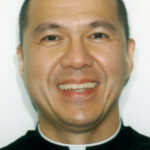Dear sisters and brothers in Christ,
“O God, who desire not the death of sinners, but their conversion, mercifully hear our prayers.…”
So begins one of the prayers that we can use to bless ashes on Ash Wednesday. While, as Christians, our whole lives are to be about conversion, about turning more and more away from sin and toward God, the church gives us Lent as a particular season of the year to attend to this part of our lives.
Sin wounds, and even ruptures, relationships: with God, with one another, with creation itself and even with our true selves. Through the sacrament of reconciliation, and by our Lenten practices, we invite God to help us heal these relationships.
Since I wrote to you at the beginning of our last Lent together, the fissures that divide our country, our world, and even our church seem to have grown deeper. We seem to have grown more isolated, more alone; we treat one another as enemies, or as inconvenient objects to be easily discarded — especially those who are most vulnerable. Our relationships with each other are strained and broken.
And so we are summoned, this Lent, to the ancient practice of almsgiving — to “charity” in the true sense of the word, to love. Yes, that can — and should, as we are able — include financially supporting ministries and services to those in need. Our CRS Lenten Rice Bowl project is a good example of that. But true charity also includes the gift of ourselves: of time, of our presence, of a listening ear, of a deep respect for all human life. That’s how the ugly wounds of division that scar us can be healed.
Pope Francis notes in his Lenten message that we have embraced a way of life that says: “Too much is never enough;” that happiness lies in getting it “all” and getting it “now” — no matter the cost to our common home. So our relationship with the world and all that is in it is strained, broken.
Consequently, we also are called to the ancient practice of fasting — to remind us that all is gift, that all have a right to what they need. The minimum that the church asks of us this season is this:
• Ash Wednesday and Good Friday are days of fast. On days of fast, one full meal and two lesser meals are allowed. Eating between meals is not permitted. Catholics between the ages of 18 and 59 are bound to fast.
• Ash Wednesday and all of the Fridays of Lent are also days of abstinence. On days of abstinence, meat may not be taken. The law of abstinence binds all Catholics 14 years of age or older.
• If members of the faithful are unable to observe the fast and abstinence regulations because of ill health or other reasons, they are urged to practice other forms of penance and self-denial suitable to their condition. Ignoring the laws of fast and abstinence is a serious matter.
But perhaps there are other ways to fast as well. Perhaps we need to “fast” from ways that we (mis)use water or energy, or even time itself.
We don’t always live as God’s children. In fact, we create all sorts of idols for ourselves. And by that I mean anything that replaces God at the center of our lives. It might be money or power; it might be overly busy lives and an exaggerated sense of our importance.
As a result, this Lent, let’s also renew our lives of prayer. Slow down. Take time to spend time with God, especially as we move forward with our Vision 20/20 initiative. A spiritual renewal of our diocese rests on a spiritual renewal in all our lives.
Yes, our relationships with God, with one another, and with our common home are strained; perhaps broken. But underlying these broken relationships is a broken relationship with ourselves, with the truth about who we are. We seem to have embraced the idolatrous lies that we are self-sufficient. That “it’s all about me” — and that everyone, and everything, else is there for my benefit alone. Maybe we don’t say it that starkly, but we do often act that way — in big and small ways, in private and public ways.
So, this Lent, through our prayer and fasting and almsgiving — in the various forms that these ancient practices might take in our lives today — may our eyes be opened. May our eyes be opened to the truth about ourselves: we are beloved children of God; but we are not God. We are not lone rangers, but part of a web of relationships. May our eyes be opened to the truth that all is gift, and that we are called to lives of gratitude. May our eyes be opened to the vision of holiness that God has for us, the Diocese of Davenport, the Church in southeast Iowa.
Renueva nuestras vidas de oración esta Cuaresma
Queridos Hermanos y Hermanas en Cristo,
“Oh, Dios, que no deseas la muerte del pecador, sino su conversión; escucha misericordiosamente nuestras oraciones…”
Así comienza una de las oraciones que se pueden usar para bendecir las cenizas el Miércoles de Ceniza. Como cristianos, sabemos, que toda nuestra vida debe ser sobre la conversión, sobre cómo alejarnos cada día más y más del pecado y volvernos hacia Dios, por eso, la Iglesia nos ofrece la Cuaresma como un tiempo específico del año litúrgico para centrarnos en esta parte de nuestras vidas.
El pecado hiere y hasta rompe relaciones: con Dios, con los demás, con la misma creación e incluso con nuestro verdadero ser. A través del Sacramento de la Reconciliación y de nuestras prácticas de Cuaresma, pedimos a Dios que nos ayude a sanar estas relaciones.
Desde que les escribí al inicio de nuestra última Cuaresma, las fisuras que dividen nuestro país, nuestro mundo e incluso nuestra Iglesia, parecen haber crecido. Parece que nos hemos vuelto más aislados, más solos; nos tratamos unos a otros como enemigos o como objetos inconvenientes; como para ser descartados fácilmente, en especial, aquellos que son más vulnerables. Nuestras relaciones son tensas y/o están rotas.
Y, por eso, somos llamados esta Cuaresma, a la antigua práctica de la limosna, a la “caridad” en el verdadero sentido del término, que es el amor. Sí, eso puede -y debemos, si lo podemos hacer-incluir los ministerios y servicios de apoyo económico a los necesitados. Nuestro proyecto del Tazón de Arroz Cuaresma de CRS, es un buen ejemplo de ofrecer. Pero la verdadera caridad también incluye el don de nosotros mismos: ofrecer nuestro tiempo, nuestra presencia, un oído atento, un profundo respeto por toda la vida humana. Así es como se pueden curar las terribles heridas que nos dividen y que nos asustan.
Papa Francisco señala en su mensaje para Cuaresma que nosotros hemos abrazado una forma de vida que dice: “Mucho no es suficiente”; que la felicidad descansa cuando conseguimos ‘todo’ y conseguirlo ‘ahora’, sin importar el costo a nuestro casar común. Así que nuestra relación con el mundo y todo lo que hay en él es tensa, rota.
Por consiguiente, también estamos llamados a la antigua practica de ayunar, para recordarnos que todos es un regalo, que todo lo que tenemos derecho a lo que necesitamos. Lo mínimo que la Iglesia nos pide durante este tiempo es:
• Miércoles de Ceniza y Viernes Santo son días de ayuno. En días de ayuno, una comida completa y dos comidas menores. No se permite que se coma entre comidas. Los católicos entre los 18 y 59 años están obligados de ayunar.
• El Miércoles de Ceniza y todos los Viernes de Cuaresma son días de abstinencia. En días de abstinencia, no se debe comer carne. La ley de abstinencia obliga a todos los católicos de los 14 años o más.
• Si los fieles de una comunidad no pueden observar las regulaciones de ayuno y abstinencia debido a problemas de salud u otras razaones, entonces ellos están llamados a practicar otras formas de penitencia y abnegación adecuadas a su condición. Ignorar las leyes de ayuno y abstinencia es un tema realmente serio.
Pero quizás haya otros caminos para ayunar también. Quizás necesitamos ‘ayunar’ de las formas en que (mal) usamos el agua o la energía o, incluso, nuestro propio tiempo.
No siempre vivimos como hijos de Dios. De hecho, creamos todo tipo de ídolos para nosotros mismos. Y con esto quiero decir, cualquier cosa que reemplace a Dios como el centro de nuestras vidas. Puede ser dinero o poder; puede ser una vida demasiado ocupada con un sentido exagerado a sentirnos importantes.
Como resultado, en esta Cuaresma, renovemos también nuestras vidas de oración. Ir más despacio. Tómese tiempo para pasarla con Dios, especialmente a medida que avancemos con nuestra iniciativa Visión 20/20. Una renovación espiritual de nuestra diócesis se fundamente en una renovación espiritual en toda nuestra vida.
Sí, nuestra relación con Dios, entre nosotros y con nuestra casa común son tensas, quizás rotas; es quizás porque la relación con nosotros mismos, está rota; la verdad de lo que realmente somos, está rota. Parece que hemos abrazado las mentiras idólatras, de sentirnos que somos autosuficientes. Que “todo se trata de mí” y que todos y todo, están ahí solo para mi beneficio. Tal vez no lo decimos con crudeza, pero a menudo actuamos de esa manera, en formas grandes y pequeñas, en formas privadas y públicas.
Por lo tanto, esta Cuaresma, a través de nuestra oración, ayuno y limosna, en las diversas formas que estas antiguas prácticas podrían adoptar en nuestras vidas hoy, pueden abrir nuestros ojos. Que nuestros ojos se abran a la verdad sobre nosotros mismos: somos hijos amados de Dios; pero nosotros no somos Dios. No somos guardabosques solitarios, sino parte de una red de relaciones. Que nuestros ojos se abran a la verdad, que todo es un regalo, y que estamos llamados a una vida de gratitud. Que nuestros ojos se abran a la visión de santidad que Dios tiene para nosotros, para la Diócesis de Davenport, para la Iglesia en el sureste de Iowa.
Sincerely in Christ/Sinceramente en Cristo,
Most Rev. Thomas R. Zinkula/Rev. Mons. Thomas Zinkula
Bishop of Davenport/Obispo de Davenport











